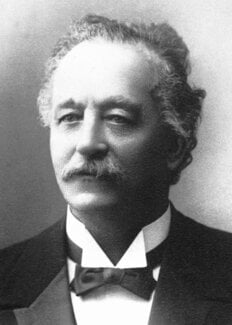Élie Ducommun
Biographical
 Elie Ducommun (February 19, 1833-December 7, 1906), Swiss journalist, eloquent lecturer, business executive, steadfast advocate of peace, was born in Geneva, the son of a clock maker whose original home was in Neuchâtel. Early in his boyhood he gave evidence of his capacity to make the most of his remarkable talent and intelligence by intense application.
Elie Ducommun (February 19, 1833-December 7, 1906), Swiss journalist, eloquent lecturer, business executive, steadfast advocate of peace, was born in Geneva, the son of a clock maker whose original home was in Neuchâtel. Early in his boyhood he gave evidence of his capacity to make the most of his remarkable talent and intelligence by intense application.
Having completed his early studies in Geneva at the age of seventeen, he obtained a post as tutor for a wealthy family in Saxony, remaining there for three years and becoming expert in the German language. Upon returning to Geneva, he taught in the public schools for two years and then in 1855 at the age of twenty-two, began his journalistic career with the editorship of a political journal, the Revue de Genève. In one way or another he was connected with journalistic enterprises for the rest of his life. In 1865 he moved to Bern where he founded the radical journal, Der Fortschritt [Progress], which was also published in French under the title Progrès; in 1871-1872, he edited Helvétie; beginning in 1868, he edited the news sheet, Les États-Unis d’Europe, published by the Ligue internationale de la paix et de la liberté [International League for Peace and Freedom]; and after 1891, as head of the Permanent Peace Bureau, he prepared or edited innumerable appeals, pamphlets, reports, news sheets, and the like for the peace societies and the international peace congresses.
He was, indeed, a «literary» man, absorbed for the most part in journalism but finding time, also, to publish poetry and to perform his duties as official translator for the National Council. August Schou, director of the Norwegian Nobel Institute, points out that Ducommun’s writing often showed «striking acuity of thought», citing a dialogue he wrote in 1901 in which he refutes the notion current in that day that a war between major powers would be short because of the destructiveness of modern weapons, and predicts, in its stead, a long «war of attrition with alternating advances and retreats, and with operations bound up with a system of trenches and strongpoints»1.
Ducommun was also a political figure of some consequence. In Bern he was a member of the Grand Council for ten years; in Geneva, prior to his leaving in 1865, he was a member of the Grand Council for nine years, becoming vice-chancellor in 1857 and chancellor of state of Geneva in 1862.
He was a business executive as well. For thirty years, beginning in 1875, he was secretary-general of the Jura-Bern-Lucerne railroad, or as it was later called after a merger, the Jura-Simplon line. This position required, according to Frédéric Passy, «the rarest qualities of exactitude, order, activity, and firmness»2. When the line was purchased by the state in 1903, Ducommun resigned.
Ducommun, meanwhile, gave virtually every spare moment at his disposal to his work for peace, most notably after 1890 when he consented to organize and to direct the International Bureau of Peace. From the inception of the Bureau until his death, Ducommun devoted himself, at his own insistence without remuneration, to carrying out its purposes of uniting the many different peace societies throughout the world, preserving archives, preparing for the congresses, implementing their decisions, and acting as a clearinghouse for all kinds of information about peace and the activities on its behalf.
Élie Ducommun died at the age of seventy-three of a disease of the heart and lungs.
| Selected Bibliography |
| Dictionnaire historique et biographique de la Suisse. Neuchâtel, 1924-. |
| Ducommun, Élie. Much of Élie Ducommun’s correspondence is deposited in archives of the International Peace Bureau in Geneva, Switzerland. |
| Ducommun, Élie, Derniers sourires: Poésies précédées d’une notice biographique. Bern, 1908. |
| Ducommun, Élie, Discours sur l’œuvre de la paix prononcé à Genève le 23 mai 1893. Bern, 1893. |
| Ducommun, Élie, «The Permanent International Bureau of Peace», The Independent, 55 (March 19, 1903) 660-661. |
| Ducommun, Élie, Précis historique du mouvement en faveur de la paix. Bern, 1899. |
| Ducommun, Élie, Sourires: Poésies. Bienne, 1887. |
| Obituary, Journal de Genève (8 décembre 1906). |
| Obituary, Journal de la paix (11 décembre 1906). |
| Passy, Frédéric, «The Recipients of the Nobel Prize of Peace», The Independent, 55 (March 5, 1903) 554-557. |
1. Nobel: The Man and His Prizes (Amsterdam: Elsevier, 1962), pp. 547-548.
2. «The Recipients of the Nobel Prize of Peace», The Independent, 55 (March 5, 1903) 556.
This autobiography/biography was written at the time of the award and first published in the book series Les Prix Nobel. It was later edited and republished in Nobel Lectures. To cite this document, always state the source as shown above.
The Nobel Foundation's copyright has expired.Nobel Prizes and laureates
Six prizes were awarded for achievements that have conferred the greatest benefit to humankind. The 14 laureates' work and discoveries range from quantum tunnelling to promoting democratic rights.
See them all presented here.
